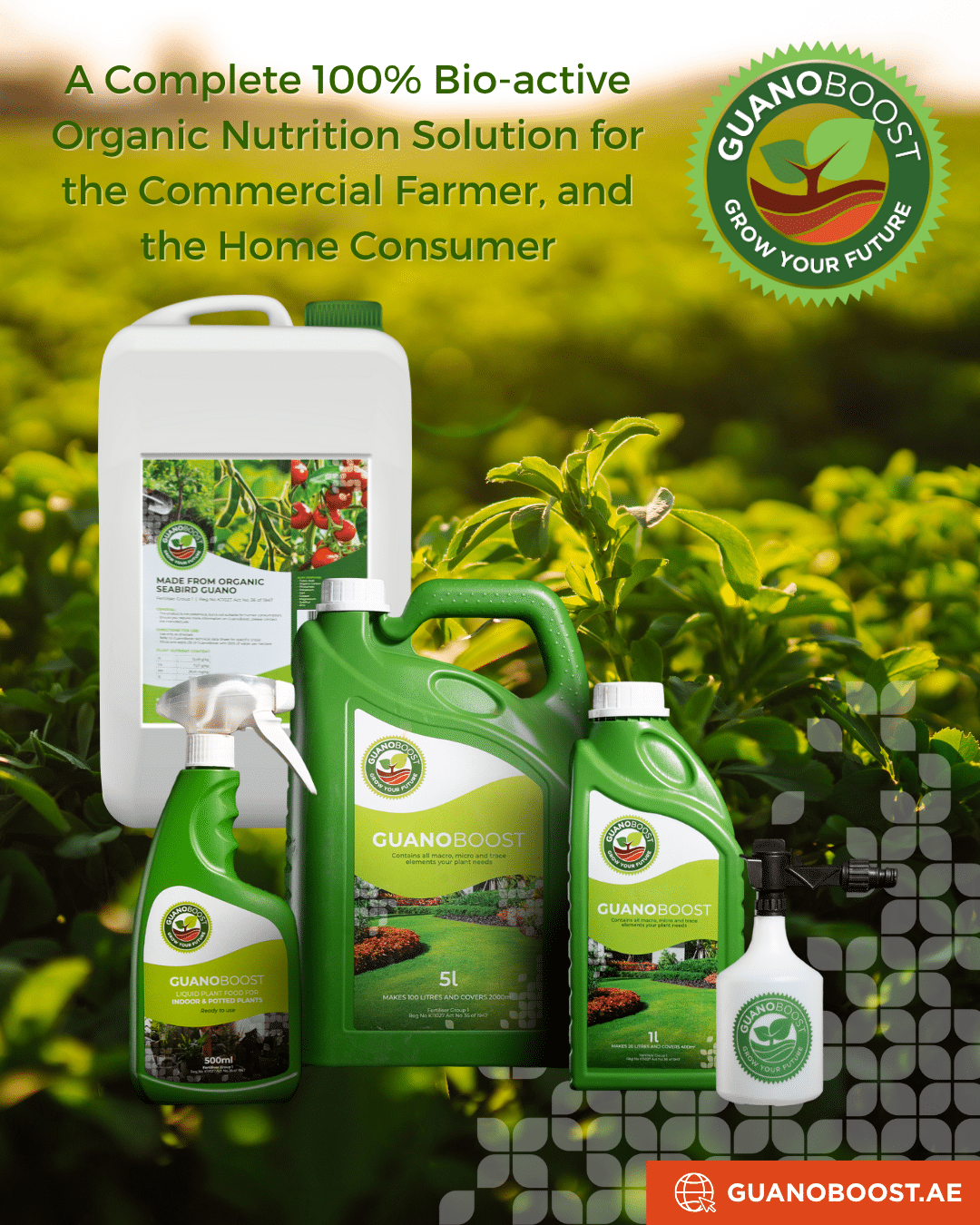Key Takeaways
- GuanoBoost, a bioactive, nature-based organic fertilizer and soil bioactivator made from seabird guano and water, has completed UAE registration and organic certification following a 12-month process.
- The product contains naturally derived NPK, Bacillus microbes, amino acids, and fulvic acid developed through anaerobic fermentation to support soil biology.
- Local trials—most recently on sorghum in Sharjah—show promising early improvements in soil texture, vigor, and resilience in saline environments.
- Founder Lurlene Boscombe Dijkstra sees opportunities to support farmers, landscapers, and households in transitioning toward regenerative practices.
- The startup is advocating for education and policy support to help expand crop diversity and long-term soil health in the region.
From Personal Health to Soil Health With GuanoBoost
When South African entrepreneur Lurlene Boscombe Dijkstra moved to the UAE, her personal connection to soil health was already established. After a breast cancer diagnosis and chemotherapy and radiation treatment the year before moving to Dubai, she began reassessing how food production influences human well-being.
“I started asking where our food comes from and how it impacts our health,” she said. Her experience led her to test and adopt natural soil inputs at home in South Africa—eventually discovering GuanoBoost, a product she later sought to introduce to the UAE.
“What I love about GuanoBoost is that it’s a bioactive, 100% natural formulation—just guano and water—that actively restores soil life and supports regeneration,” she explained.
Her entry into agriculture may not be traditional, but it aligns with a broader movement linking soil regeneration, nutrition, and environmental resilience.
A Milestone: Organic Certification in the UAE
Registering a new biological product in the UAE required both technical and administrative persistence. Dijkstra spent 12 months navigating national requirements to meet organic certification and regulatory standards before commercial sales could begin.
“The process was a valuable learning curve for me in navigating a detailed system,” she said. “Our relationship evolved into one of mutual respect. They’ve (MOCCAE) have been really supportive, which helped us move forward understanding clearly what the requirements were.”
While demanding, she believes the process strengthens confidence in sustainable alternatives—ensuring that agricultural products marketed as “organic” are rigorously evaluated.
How GuanoBoost Works: A Bioactive Approach to Fertilization
Guano has been used in farming for centuries—once known as “white gold” for its natural concentration of nutrients. GuanoBoost builds on that history with a modern adaptation.
The seabird guano used in GuanoBoost is collected from Namibia’s Atlantic coast, where birds rest on wooden platforms designed to protect their habitats. Guano naturally accumulates and is harvested once annually under government oversight.
After collection, the raw material undergoes:
- Anaerobic fermentation, unlocking nutrients and enabling microbe proliferation
- Fine filtration into a liquid form suitable for irrigation systems
- Stabilization to support shelf life without synthetic additives
Dijkstra describes the result as a triple-action product that simultaneously provides nutrients, stimulates soil biology, and activates microbial communities.
“The beauty of GuanoBoost is that it’s natural, salt-tolerant, and acts as a fertilizer, soil biostimulant, and microbial bioactivator,” she said. “It accelerates compost breakdown, enhances nutrient uptake, and helps heal degraded soils.”
This is particularly relevant in the Gulf, where soils often lack organic matter, biological activity, and nutrient-holding capacity.
Early Trials Show Positive Results in Harsh Conditions
To validate performance locally, GuanoBoost has been trialed on several farms. The company recently completed a large field trial in Sharjah on sorghum, a crop known for its adaptability to arid climates.
“These results are encouraging and demonstrate GuanoBoost’s potential as a key input in agricultural practices adapted to the UAE’s climate,” Dijkstra said, noting clearer root development and improved soil structure as early indicators.
Beyond macronutrients, she emphasizes the importance of microbial activity. Bacillus bacteria in the formulation multiply rapidly, helping soils cycle nutrients more efficiently—especially when paired with compost, manure, or mulching strategies.
“Cow and chicken manure are essential for adding organic matter to UAE soils,” she explained. “But they take time to break down. GuanoBoost complements these inputs by making nutrients immediately available and stimulating soil biology.”
She also notes that many growers will require a gradual approach: “Farmers won’t switch overnight, but GuanoBoost helps them start that transition toward healthier, more resilient soils.”
Unlocking Crop Diversity and Supporting UAE Food Security
While the UAE continues to strengthen domestic agriculture, adoption barriers remain. Influences like import competition, pricing pressures, and tight production cycles limit experimentation.
“Farmers grow the same crops—tomatoes, cucumbers, eggplants—because that’s what the market demands,” Dijkstra said. “But for food security, we need more diversity.”
She believes enabling regenerative inputs can help broaden what is economically viable to grow by strengthening overall soil performance and reducing longer-term input costs.
“There’s so much talk about innovation and millions spent on R&D, yet nature already gives us many answers,” she said. “We just need more support for existing solutions like GuanoBoost.”
GuanoBoost Expanding to Landscapes, Nurseries, and Home Gardens
GuanoBoost is also gaining traction beyond farms. Trials with landscapers and nurseries show improvements in plant survivability, especially during transplantation. The product’s salt-tolerant microbial profile is positioned as an asset for municipal greenery and housing developments in coastal zones.
“It’s one product for everything—safe for children, pets, and easy for anyone to use,” Dijkstra said, as the company prepares to expand distribution to home gardeners.
GuanoBoost plans to align with initiatives such as the UAE’s “Plant the Emirates” campaign to encourage household food growing.
Education as a Foundation for Change
Alongside commercial progress, Dijkstra is prioritizing public education. She hopes to collaborate with schools and community groups to introduce young people to soil biology and food systems early.
“We need to teach the next generation where food comes from,” she said. “Farmers are essential, but change begins with awareness.”
By 2035, her goal is clear: Every household and at least 30% of farms across the region should be using soil-building solutions—whether organic or integrated with existing programs—to lower chemical dependency and support local supply chains.


